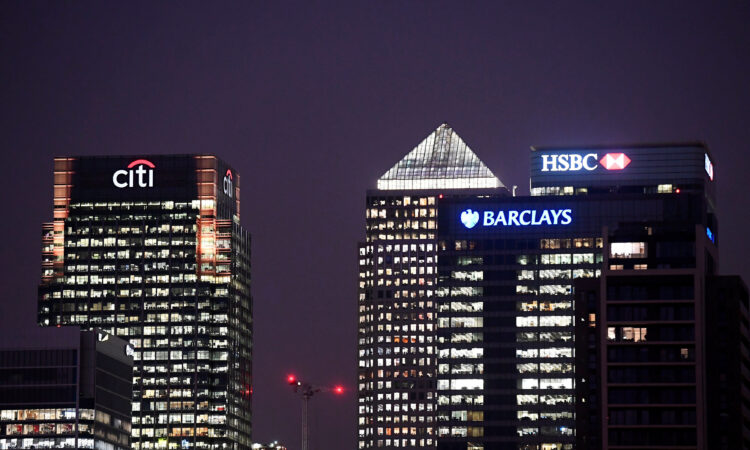
Now that the third-quarter bank reporting season has ended, it is worth looking at the trends that have come to define how individual companies respond to the problems that have plagued the sector. It was pleasantly surprising that Europe’s investment banks posted third-quarter results that were materially better than their American counterparts, despite the latter’s advantage in fixed income trading and deeper wells of capital.
The reason for this was straightforward – rising interest rates are finally giving European institutions, with their hybrid business models, the interest income that their large deposit and lending bases have the potential to generate.
Deutsche Bank (DE:DBK) confounded its many critics after delivering quarterly results that were the best in years, with quarterly pre-tax profits rising by €1bn (£862mn) to €1.6bn on the back of better corporate banking activity and rising net interest income across all its business lines. This was enough to offset the pedestrian performance of the investment bank division itself, which saw flatter pre-tax profits of €813mn on a lack of deals. As you would expect from parsimonious Germans, Deutsche Bank’s deposit rates rose by 11 per cent as people took advantage of better savings offers. Overall, not a bad turnaround considering that Deutsche was the object of speculation over its credit worthiness earlier this year.
Another institution also performing beyond most peoples’ expectations is Italy’s second-largest hybrid investment bank UniCredit (IT:UCG) whose profit generation during the third quarter means that management has now raised its target for end-of-year profits to €4.8bn, compared with €4bn, previously.
The opening up of Italy’s economy post-pandemic has been a boon for economic growth as services and tourism benefited disproportionately in a country where selling over-priced accommodation is a major industry. In addition, Italy posted GDP growth of 0.5 per cent, compared with the 0.2 per cent that had been forecast, which gives some hope that the year will end more strongly than the current expectations for a recession currently allow. An unknown is whether Italy can survive an energy crunch over the winter – the odds in favour of this are decent, the country has large strategic storage facilities and good relationships with North African suppliers.
Debit Suisse?
The main shock of the season was the share price fall at scandal hit Credit Suisse (CH:CS) which endured a 16 per cent drop in response to management’s radical plan for a $4bn (£3.5bn) capital raising to fund a huge restructuring of the business. The steep discount means that existing shareholders will be diluted by 30 per cent, with the Saudi National Bank taking a 9.9 per cent stake. In addition, the investment banking business, apart from key trading desks, will be junked in favour of returning to Credit Suisse’s origins in wealth management.
The plan surprised many observers with its scope and ambition, but arguably management had little choice after the disasters with the Archegos hedge fund meltdown and the Greensill supply chain finance scandal shredded the bank’s reputation.
The problem is that the overhaul will only generate a return on tangible assets (a key measure of bank returns) of 6 per cent by 2025, which might be the best-case scenario, whereas a respectably run bank should be able to generate 12-16 per cent in normal times.
As well as being well below the cost of capital for the average bank, this would suggest that under classic accountancy theory Credit Suisse is liquidating. In 1990, Credit Suisse First Boston, as it was then known, was more valuable than Berkshire Hathaway. These days Berkshire could pick up the bank 10 times over just using the available cash on its balance sheet.
Barclays is back
Barclays Bank (BARC) put in a creditable third-quarter performance, driven by a combination of rising rates and a notable contribution from its investment banking arm. The addition of the old Lehman Brothers trading business, picked up on the cheap after the bank went bust in 2008, means Barclay’s investment bank is slightly less dependent on deal flow and capital raising than its US competitors.
The volatility since the start of the year has meant the investment bank contributing 70 per cent of the bank’s total income – in fact, the investment bank generated £6.5bn of net trading income over the first nine months of the year, compared with £4.9bn for the comparable period in 2021. However, there was a notable slowdown in trading activity in the third quarter, suggesting the run might be coming to an end, with the deposit bank now taking the lead as lending margins widen. Barclays, along with the other big name British banks, might also benefit from a change in government policy on a potential windfall tax following reports in the Sunday Times that ministers may drop the idea.
Overall, not a bad season for the European banks, who have underperformed their US counterparts consistently over the past decade. If the threat of windfall taxes starts to lift, then a rise in low share valuations can be expected, as long as credit defaults in the quarter ahead are manageable.





